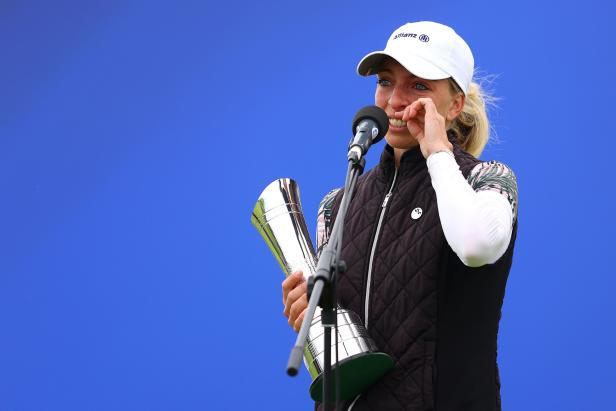Products You May Like
“I almost quit playing last year.” That sentence might go down as one of the most unlikely ever to be spoken during an AIG Women’s British Open champion’s speech. But it’s Sophia Popov’s reality.
A battle with Lyme disease that went undiagnosed for three years and resulted in a 25-pound weight loss, and a game that wasn’t up to the standards she knew she was capable of left the 27-year-old German questioning whether she should continue on as a professional golfer. But Popov instead pushed forward into the 2020 season, believing that this is what she was meant to do. Now, all questions are answered: Popov is a major champion, Germany’s first female major winner, shooting a closing three-under 68 Royal Troon to win by two over Jasmine Suwannapura.
In 2019, Popov lost her LPGA card, sending her back to the tour’s Q Series. But that didn’t go well. She missed getting her LPGA card by a shot, landing her on the Symetra Tour. At a time when she wanted to be moving forward with her career, it was a step backward. Then the global pandemic hit, and the shortened Symetra and LPGA schedules resulted in the tour carrying over players’ 2020 status into 2021. Popov was suddenly looking at two seasons on Symetra. Unless, that is, something seemingly impossible happened, and she was able to win a major—one of only two ways to get from Symetra to LPGA for 2021.
Saying it was nearly impossible for Popov to win a major isn’t a comment on her game, it’s more about even getting into the tournament. Under normal, non-COVID-19 circumstances, Popov likely wouldn’t have been among the competitors at Royal Troon. Popov dominated the Cactus Tour with three wins during the pause in the Symetra Tour season. But she didn’t get into the field at the first LPGA event of the restart, last month’s Drive On Championship at Inverness Club in Ohio. She was at the event anyway, though, caddieing for friend Anne van Dam. A week later at the Marathon LPGA Classic, Popov did get into the field, despite her low rank on the priority list.
“I think a lot of players didn’t want to come to the States, either from Europe or from Asia,” Popov explained as to why players lower than usual on the priority list got into the event. “I took advantage of it and used the opportunity to get here.”
Her T-9 finish the second Ohio event, Popov’s first top 10 ever on the LPGA Tour, got her into the field at the AIG Women’s British Open, just her 34th LPGA start since her rookie year in 2015. She played well from the first round: She was T-2 after an opening 70 Thursday and remained there after a shooting a 72 on Friday, two rounds played in some of the most rainy, windy Scottish weather imaginable. A Saturday 67 leaped her into a three-stroke lead entering the final round.
Ranked No. 304 in the world at the start of the week, Popov started Sunday with a bogey on the first hole.
“I told my boyfriend, I said, ‘That’s all right. We’re going to make bogeys out here. It’s fine. But we have plenty of opportunities for birdies.’ And you know, the next hole, right away I hit it close,” Popov said.
She birdied that second hole. And the third. She never lost the lead.
When Popov talks about her boyfriend, she’s talking about her caddie, Maximilian Mehles, who she met while they were both on the German National team. They both played college golf in the U.S., Popov a member of the 2013 NCAA title team at USC, and Mehles at the University of Kentucky. His hopes of turning pro, like many graduating college seniors this year, have been complicated by COVID-19. But it allowed him to be on the bag for Popov.
And he proved valuable. Popov said he kept her calm throughout the tournament, especially the nervy final round. His chatter added brief reprieves from the task at hand— pointing out passing sailboats—and added an important dose of perspective to the day. Popov’s sister-in-law is expecting a baby, and they talked about her niece’s arrival frequently on Sunday.
“All we could think about today is what if my niece comes today,” Popov said. “We kept bringing it up again just to get my mind off of things because those are things, honestly, that are more important in a personal life, and that put golf into perspective. And what was on the line and I think that really helped me because I said no matter what happens today, I have this amazing gift of a niece coming and I’m so excited about that.”
Mehles was also helpful in the smaller details: “He told me to eat and drink, which I always forget,” Popov said, laughing.
Popov’s strategy was simple: hit fairways, hit greens, let the hot putter do its thing. It was a strategy she said she got from caddieing for van Dam. Usually aggressive, Popov said she learned while being on the bag that aggressiveness doesn’t always make sense.
“There were maybe four or five [holes] where we said, All right, let’s go right at it. But all the others were just, you know, let’s play it a couple yards left or a couple yards right of the pin, and just give yourself opportunities,” Popov said. “I knew I could make a couple, if I keep giving myself 15- to 25-footers all day, a couple of them are going to fall and that’s what happened at the end, so I’m glad that worked out for me.”
One of the most fun things to watch was how hard Popov kept swinging. Walking down 16 with a three-shot lead, she was still swinging like it was the first round and she had nothing to lose. In that moment, you’d expect a player brand new to the big moment to succumb to those natural feelings of wanting protect the lead, to gingerly coax the win in down the stretch. But that’s not Popov’s nature.
“When I get a little tentative, I hang them out to the right. I was like, OK, after I think 11, I said, No more of this. Just swing aggressively. You’re fine. Your misses are just barely right right now, which is great. You can just kind of be aggressive and let everything fall a little bit to the right,” Popov said. “I can just go after it, and I knew that’s the only way that it could work for today because every time I swing tentative, it’s not a good outcome, so that wasn’t an option.”
Her hard-swinging ways put her in the dream-like position of having three putts on Troon’s 18th green to win. Her first put was, of course, right on line. But, it came up a couple inches short. Once she marked it, she started to cry. After the frustrations and fatigue of her first three years on tour unknowingly playing with Lyme disease, after losing and regaining her weight and strength, after losing her card, after thinking it was probably time to quit golf altogether, she clutched the AIG Women’s British Open trophy, validated in her decision to keep believing for just a little while longer.


